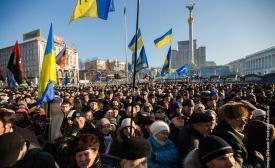media

Barbora Maronkova on how civil society rose to the occasion in the fight against disinformation in Ukraine.
On a balmy mid-March evening, 11 Russian journalists clustered around a table in one of Austin’s time-honored barbeque joints, a platter piled high with brisket and a trough of mashed potatoes between them. The group had gathered for a traditional southern meal on the final evening of a ten-day press tour sponsored by the U.S. Embassy in Moscow and the State Department’s Foreign Press Center.
Finland’s education system, basic income experiment, appeal as a travel destination and possible membership in Nato were the most dominant themes in global media reports about the country in 2016, finds a survey conducted by the Ministry for Foreign Affairs.
A month after Trump was elected, Republicans in Congress changed the VOA’s governing structure, replacing its independent and bipartisan board of governors with a CEO appointed directly by the president. [...] Taken together, the moves indicate that Trump is poised to turn the government news service—which reaches a global audience of 236 million every week through its radio and TV broadcasts—into a mouthpiece for his personal brand.
In January 2010, secretary of state Hillary Clinton stood before the world and delivered a landmark address, calling the internet a “new nervous system for the planet.” She was describing an emerging State Department doctrine known as the “internet freedom agenda,” which built on a universal declaration that “people have the right to seek, receive, and impart information and ideas through any media and regardless of frontiers.”
Many people of the region today believe that the ISIS communication approach is so slick, so technological, so modern that it cannot be the work of jihadists recruited in the hinterlands of poor Muslim countries alone. There is surely something big and sophisticated behind it, with an objective in mind: kick Islamism where it hurts the most: religious credibility.
Putin perfectly understood the power of the media that helped propel his famously unpopular predecessor Boris Yeltsin into power in 1996. So the first thing he did after assuming the presidency in 2000 was to force all the major TV channels to submit to his will. Oligarch owners were either co-opted, jailed or exiled, and by 2006 most major Russian media were either directly or indirectly under Putin’s administration’s control.
VOA began radio broadcasting in 1942, to combat Nazi propaganda. Per its charter, it is mandated to “serve as a consistently reliable and authoritative source of news.” Since WWII, it has been the front-edge of America’s informational interface with citizens around the world, particularly those battling dictatorships and tyranny. [...] VOA is the largest public diplomacy program of the United States government and broadcasts in more than 40 languages.







